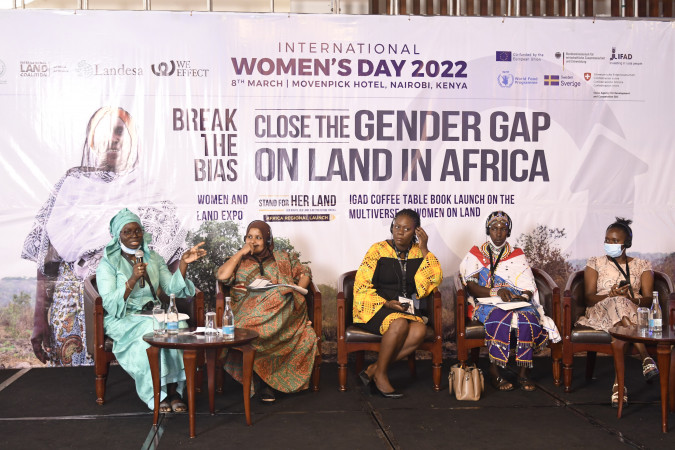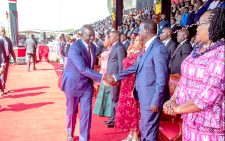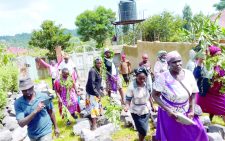Charting path to women land ownership rights

When Esther Acharri lost her husband in 1998, she did not know it would be the beginning of her long journey to fight for a land she bought with him a decade earlier.
The ‘land grabber’ was not her family or anyone closely related. It was a stranger she met while seeking to fend for her family.
Acharri’s husband was the sole breadwinner and when he died, the burden of taking care of their five children lay squarely on her shoulders.
“I did not have any source of income and so I decided to sell a portion of the land. It was just a small portion of the 2 acres of land,” she says.
However, the buyer later changed his mind and demanded for his money back. Acharri had already utilised it.
The buyer threatened her with a court case if she failed to pay back his money.
She says she was forced to take a bank loan so as to repay the loan and took the money to the buyer’s lawyer.
Acharri says what happened is still a mystery because the money never reached the said buyer.
Ten years later after settling the debt, Acharri was shocked to receive a notice letter demanding her to vacate the land within a few days.
Upon following it up with her lawyer, she learnt the buyer had sold the entire 2 acres land instead of his portion allegedly for failing to receive the payment. The new buyer gave Acharri and her family few days to vacate the land and not even considering her husband’s grave sits on that piece of land.
She moved to court where the new buyer was temporarily stopped from evicting her family or trespassing on the land.
“On that land sits my husband’s benefits which I received after his death and decided to build a house for my children, “she says.
She adds: “They did this because I’m a woman and thought I did not have the rights to own land. But I’m going to fight for it to death,”
The land is estimated to be worth millions of shillings considering its sits next to Kisumu-Busia Highway.
Women’s rights to own land is a big talking point not only in Kenya but Africa in general. Certain archaic tradition forbid women from owning land.
According to a national survey, women only hold one percent of total title deeds in Kenya despite recent data showing the population of women to men is 2:1.
Another five percent of women hold title deeds but jointly with men. All this is despite the fact women provide 89 percent of farming labour force and 32 percent of households are managed and provided for by women.
In Taita Taveta County, the problem is not in any different. Hollines Mwadime says widows are the most affected group of women as they are normally denied land by the husband’s family.
“This happens mostly when the widow does not have male offsprings as it is believed girls will be married off and therefore do not have any right to their father’s land,” she says.
Unmarried and divorced
She further says for the unmarried and divorced women, they also face difficulties in inheriting land in their own families as they are expected to inherit at their husband’s home.
“It is a double tragedy for them. They are being denied land in their husband’s home and in their own families. The men in the families mostly force them out thus ending up on streets or renting rooms in shopping centres, “she says.
The situation has been made worse by lack of goodwill by the community to ensure equality when it comes to division of ancestral land. Also, slow wheels of justice caused by delays in determination of land cases has made most women lose trust with the court process thus shying away from seeking legal redress therefore opting out of the fight to own land.
But this situation is about to change with the launch of “Stand for Her Land” campaign aimed at securing women land rights in Africa and across the globe.
The campaign is already running in several countries including Kenya, Uganda, Tanzania, Senegal and Colombia.
The journey was marked with the unveiling of the African Chapter and the plans are being rolled out on how to make sure women have equal rights to land.
Esther Mwaura, the global advocacy director for “Stand for her Land” says the focus is to make alliances with grassroots women groups to come up sustainable guidelines for equity.
She says their intention is to bring to the table government agencies who will then synergies recommendation from grassroots, adopt them into policies.
This will be done in consideration of the cultures and taboos of various communities in Africa since they cannot be ignored when it comes to solving land problems touching on women.
Mwaura says lands issues are not isolated in particular counties as the problem cuts across all communities who have different beliefs on women owning land.
“We also want to use these communities to gather data on women owning land and have the government mitigate the loopholes and issue more title deeds to women, “she says.
They also aim at ensuring court cases are heard and determined expeditiously contrary to the current situation where land cases can go for more than five years.
Alternative dispute resolution is also one of the mechanism that will be used in resolving land disputes especially when women are denied their right to own land.
“Grassroot organisations will do the research to identify the challenges and we will bringing all stakeholders on the table to discuss how to solve these challenges,” she says
Revolution at the community level is already taking a centre stage with sensitization of the local residents and locals leaders on how to mediate land conflicts amicable.
In Kakamega County, Butsotso chief Wycliffe Kombo says local administration offices are the focal point in resolving the issue at hand as they are familiar and understand the cultures thus the most suitable to resolve cases before seeking legal redress.
“I’m from a place where culture denies women their land rights. On daily basis, I receive close to five cases of women denied land by their husbands, sons or brothers. I however resolve the differing pacts through dialogue,”
The chief alongside village and clan elders have taken it upon themselves to ensure they resolve the issues within the common and still ensure women own land
But when the oppressor holds on to their stand, Kombo says they usually advice the aggrieved women to seek legal redress. Being a product of woman who was denied land after losing their father, Kombo says he is now committed in educating other chiefs and locals leaders on how to handle land cases fairly. He is now taking the campaign to other areas in the Western and Nyanza regions where there is reservation when it comes to women owning land.











